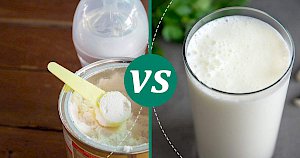Buttermilk vs Milk Powder: Nutrition & Calories Compare


Buttermilk vs Milk powder
Nutrition Facts
Serving size:
change
5g10g15g20g30g40g50g60g80g100g120g140g160g180g200g220g250g300g350g400g450g500g600g700g800g900g1000g
1oz2oz3oz4oz5oz6oz7oz8oz10oz12oz15oz20oz25oz30oz35oz40oz50oz
Amount Per Serving:
Serving size:
change
5g10g15g20g30g40g50g60g80g100g120g140g160g180g200g220g250g300g350g400g450g500g600g700g800g900g1000g
1oz2oz3oz4oz5oz6oz7oz8oz10oz12oz15oz20oz25oz30oz35oz40oz50oz
Amount Per Serving:
Buttermilk vs Milk Powder 100g Compare
| per 100g | Buttermilk | Milk powder |
|---|---|---|
| Calories | 105 | 496 |
| Carbohydrates | 49 g | 38.42 g |
| Fat | 5.78 g | 26.71 g |
| Protein | 34.3 g | 26.32 g |
| Water | 2.97 g | 2.47 g |
| Calcium | 1184 mg | 912 mg |
| Iron | 0.3 mg | 0.47 mg |
| Magnessium | 110 mg | 85 mg |
| Phosphorus | 0.4 mg | 2.2 mg |
| Potassium | 1592 mg | 1330 mg |
| Sodium | 517 mg | 371 mg |
| Zink | 0.4 mg | 2.2 mg |
| Vitaminium A | 175 µg | 934 µg |
| Vitaminium B1 (Thiamine) | 0.392 mg | 0.283 mg |
| Vitaminium B2 (riboflavin) | 1.579 mg | 1.205 mg |
| Vitaminium B3 (Niacin) | 0.876 mg | 0.646 mg |
| Vitaminium B6 | 0.338 mg | 0.302 mg |
| Vitaminium B9 (Folic acid) | 0.047 mg | 0.037 mg |
| Vitaminium C | 5.7 mg | 8.6 mg |
| Vitaminium E | 0.1 mg | 0.58 mg |
A Tale of Two Staples: Buttermilk and Milk Powder
When it comes to the dairy aisle, the variety can be overwhelming. Among the plethora of choices, buttermilk and milk powder stand out not only for their unique textures and flavors but also for their versatility in both cooking and baking. Before we dive into the comparison, let's sprinkle in some fascinating facts that might surprise you. Did you know that historically, buttermilk was the liquid left behind after churning butter out of cultured cream? Today, it's commercially produced by adding lactic acid bacteria to milk. On the other hand, milk powder, also known as powdered milk, is made by evaporating milk to dryness, which significantly extends its shelf life.
Unveiling the Nutritional Tapestry
At first glance, comparing buttermilk and milk powder might seem like weighing apples against oranges. However, both play pivotal roles in our diets, and understanding their nutritional content can help us make informed choices. Buttermilk, with its tangy zest, is lighter on calories, boasting only 105 calories per 100 grams, compared to milk powder's hefty 496 calories. This makes buttermilk an excellent choice for those monitoring their calorie intake.
However, when it comes to protein, milk powder takes the lead with 34.3 grams, offering a substantial amount more than buttermilk's 26.32 grams. Protein is crucial for muscle repair and growth, making milk powder a potential favorite among athletes and bodybuilders.
Buttermilk and milk powder are both low in fiber and sugar, but they diverge significantly in their fat content. Milk powder contains a higher fat content, 26.71 grams, which is nearly five times more than buttermilk's 5.78 grams. This difference might influence your choice depending on your dietary fat requirements.
Minerals, Vitamins, and Beyond
The tale continues with the exploration of minerals and vitamins. Buttermilk provides a generous dose of calcium, 1184 mg, surpassing milk powder's 912 mg. This makes buttermilk an excellent option for supporting bone health. Iron, magnesium, and potassium also play starring roles in both buttermilk and milk powder, contributing to various bodily functions from oxygen transport to muscle and nerve function.
Vitamin-wise, milk powder shines brighter in vitamin A content with 934 IU, significantly higher than buttermilk's 175 IU. Vitamin A is vital for vision health, immune function, and skin integrity. Both buttermilk and milk powder offer a range of B vitamins, though in varying amounts, supporting energy production and cell health.
Choosing What's Best for You
The decision between buttermilk and milk powder boils down to personal needs and preferences. If you're watching your calorie intake or seeking to increase your calcium intake, buttermilk might be your go-to. On the flip side, if you're looking for a protein-rich option with a longer shelf life, milk powder could be the winner in your kitchen.
Regardless of your choice, both buttermilk and milk powder are versatile ingredients that can enrich your diet. Whether you're baking a cake, marinating chicken, or whipping up a smoothie, these dairy delights can add that extra oomph to your dishes. So, the next time you find yourself in the dairy aisle, you'll be well-equipped to make a choice that best suits your dietary needs and culinary endeavors.
Buttermilk 100g
105kcalCalories source
- 51% CARBS.
- 36% PROTEIN
- 14% FAT
Milk powder 100g
496kcalCalories source
- 31% CARBS
- 21% PROTEIN
- 48% FAT
Compares of buttermilk
- Buttermilk vs Cottage Cheese
- Buttermilk vs Whole Milk
- Buttermilk vs Goat Milk
- Buttermilk vs Sheep Milk
- Buttermilk vs Egg
- Buttermilk vs Egg White
- see all compares of buttermilk
Marcin Piotrowicz
calories-info.com creator
Healthy diet and healthy lifestyle promoter
Add comment